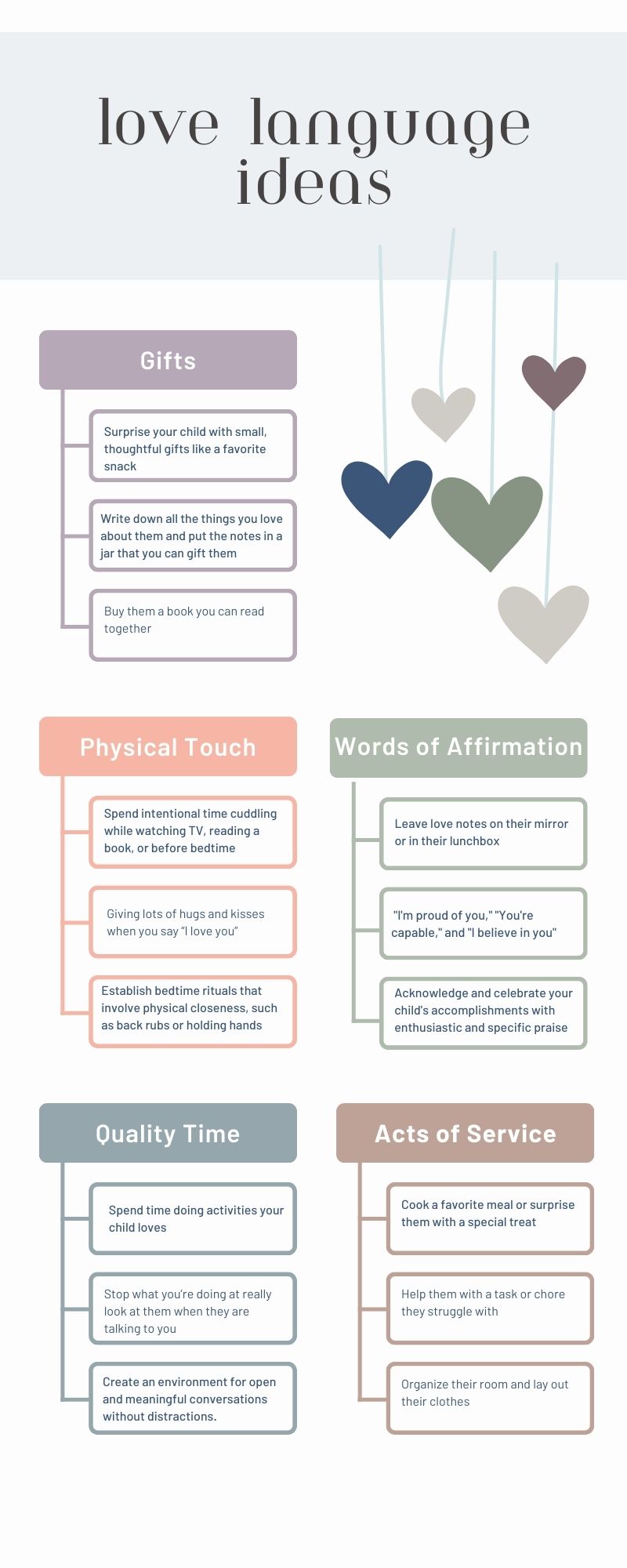Table of Contents
Understanding love languages for kids is one of the most underrated parenting hacks I’ve come across.
As parents, we work so hard to raise emotionally intelligent, resilient kids who feel confident in who they are and how they fit into the world around them. The foundation for raising healthy kids stems from how loved, supported, and accepted they feel.
But did you know that understanding your child’s love language makes everything so much easier? It’s like a guide on how to love your child in a way they can understand and receive.
Identifying Your Child’s Love Language
A quick and easy way to learn your child’s love language is to take a quiz. But you could probably take a good guess just based on what you know about them. Gary Chapman, PhD, wrote the bestselling book, “The 5 Love Languages.” In it, he explains that everyone wants to give and receive love in one of 5 ways.

- Physical Touch
- Words of Affirmation
- Acts of Service
- Gifts
- Quality Time
By observing your child and noticing how they communicate with and respond to you, you can learn a lot about their love language.
Think about your daily interactions with your child. What do their body language and facial expressions tell you? When are they really happy?
- Do they get super excited when you get them a favorite snack for lunch?
- Are they constantly telling you how much they love you?
- Does it make their day when you unpack their school bag?
- Are extra cuddles at bedtime a must?
- Do they love it when you read them a story or play a board game?
Most people have a primary and secondary love language, and it just takes some digging to find out what works for your child.
Experiment with the different love languages and see which resonates most with your child. Ask them, “What makes you feel happy and loved?” and “How can I show you that I care about you?” Pay attention to how your child expresses their feelings.
Love Languages for Kids
Physical Touch

Cuddles, snuggles, hanging on your leg, playing with your hair…sound familiar?
If physical touch is your child’s love language, they will crave close proximity and skin-to-skin contact. That can mean hand-holding, sitting on your lap, or wanting rough-and-tumble play.
I have a son who craves physical contact with me. If he has had a rough day, he wakes me up at night and won’t go back to sleep until I’m in bed cuddling with him.
Morning and Bedtime Rituals
Start and end the day with physical affection. Offer hugs, kisses, or gentle pats on the back during morning wake-ups and bedtime routines.
Cuddle Time
Set aside specific times for cuddling on the couch, reading a book together, or simply relaxing in each other’s company. This intentional closeness is exactly what your child needs to feel loved. After school restraint collapse is real so your child might need comfort and reassurance from you after a long day.
Comfort through Touch
Most kids want physical affection when they are feeling vulnerable or get hurt. But if physical touch is your child’s love language, it’s vital.
Affectionate Greetings and Goodbyes
A hug or a high-five creates that connection your child needs in a way that words can’t. This is one of those times when actions really do speak louder than words.
Customize Affection to Their Comfort Level
Respect your child’s comfort level with physical touch. Some kids are more reserved, so check in with your child and adjust accordingly.
Tricky Things To Keep In Mind
- Your child’s boundaries for physical touch may change, and it’s important to respect those changes.
- If physical touch isn’t your love language, it can be challenging to have your child in your space all the time.
Words of Affirmation

No matter your child’s love language, your words matter. But if words of affirmation are how they understand and accept love, they are more vital than you know.
If your child loves being praised and needs verbal encouragement when they’re feeling insecure, words of affirmation really do it for them. I was that kid, and my mom would leave me love notes in my lunchbox that made me feel like the most important person in the world.
Daily Affirmations
Begin or end the day with positive affirmations. Whisper in your child’s ear and tell them something specific you love or appreciate about them.
Go Heavy on the Words
Use phrases like “I love you” and “I’m so grateful to be your parent.” If you hug your child, back up the physical affection with something verbal.
Encouragement for Efforts
Acknowledge and praise your child’s efforts and hard work, not just their achievements. They need to hear you say how proud you are of them.
Positive Reinforcement
Positive reinforcement is a handy parenting tool, but it’s essential if your child’s love language is words of affirmation. They want you to praise and acknowledge their behavior.
Use Encouraging Phrases
Incorporate encouraging phrases into your daily interactions like, “I believe in you,” “You can do it,” or “I’m here to support you in whatever you choose.”
Create a Positive Environment
Use positive language and avoid criticism. Instead of saying, “You always forget,” try, “Next time, let’s try to remember together.” Words mean a lot to your child, both good and bad.
Tricky Things To Keep in Mind
- Your child will be very aware when you’re not being sincere and authentic.
- Your tone is as important as the words you say.
- Miscommunication or unintentional negative words can be particularly impactful.
Acts of Service

If your child’s love language is acts of service, you will notice that they love it when you do things for them. It could be making their favorite dinner, folding their laundry, or tidying their room. Some of you may think tidying up shouldn’t be your job. But that’s really not what it’s about. Acts of service make your child’s life easier and more enjoyable. It’s how they experience love.
Helping with Tasks
You can help your child with daily tasks like homework or completing chores. Not because you don’t think they can handle the task independently but because you know that your help will make them feel loved and valued.
Creating a Supportive Environment
Acts of service can be small, thoughtful gestures. You could set up a comfortable and organized study space and make your child’s favorite comfort food during exam time. It’s a simple gesture that shows your child that you know them.
Surprise Adventures
Surprise your child with an outing or activity that they love doing with you. It will mean so much to them that you are taking time out of your day to do something special with them.
Make the Mundane Magical
Acts of service can be everyday tasks that might seem mundane to you but can be super impactful for your child. Lay out their clothes for them in the morning or set a place for them at the table for breakfast with flowers. It’s about adding that little something special that will resonate with your child.
Tricky Things To Keep In Mind
- Your child may take advantage, and you could find yourself making their bed every day instead of it being a special act of service.
- It can be challenging to set boundaries your kids respect and help them understand that acts of service are not a given.
Gifts

Gifts as a love language are probably the most misunderstood. It’s not about spoiling your child with extravagant and expensive gifts. The gift represents a time you were thinking of them, making the sentiment more important than the actual thing you give them.
The experience of receiving something from you is what helps foster a deeper connection. The meaning behind the gift is vital, and your child may even notice the wrapping and card.
Thoughtful Surprises
Surprise your child with small, unexpected gifts like a small treat, a favorite snack, or a new book. The gift should align with your child’s interests to make it more meaningful.
Token of Affection
Give your child a token of affection to carry with them throughout the day. It could be a small keychain, a unique rock, or a piece of jewelry.
Memory Box or Scrapbook
Create a memory box or scrapbook filled with mementos of special moments you’ve shared. Leave space for your child to add to it.
Gift of Time
Plan special one-on-one time as a gift, focusing on activities your child enjoys. It could be a day at the park, a movie night, or a special outing. Gifts don’t always have to be tangible.
Use a Wishlist
Ask your child to create a wishlist of gift ideas. That way, you can surprise them with a toy they’ve been eyeing, a book by their favorite author, or a hobby-related item.
Surprise Mail
Send surprise mail to your child, such as a letter or a small package, to let them know you’re thinking of them.
Tricky Things To Keep In Mind
- You need to balance gifts with gratitude so your child doesn’t develop a sense of entitlement.
- Financial constraints may force you to get creative.
Quality Time

All kids want time and attention from their parents, but not all of them need that quality time to feel loved, seen and heard. It’s not about what you do with your child as much as the fact that you are choosing to spend your time with them.
Quality time is my eldest son’s love language. Nothing makes him happier than when I ask him to show me around his Minecraft world or offer to build Lego with him. I know I haven’t made enough time for him when he constantly pops into my office to show me his latest drawing or Lego creation.
Special Outing
Dedicate a specific time for a one-on-one outing with your child. I always love the park or going on a nature walk because it gives me a chance to have real conversations with my son.
Individual Movie Night
Have a special movie night, complete with their favorite snacks. Be sure to put away your phone and be present with them during the movie. I don’t know how many more times I can watch Moana, but I know it makes my son crazy happy to sit on the sofa and sing along with me.
Crafting Together
Crafting is a great way to spend quality time with your child. You can try new crafts together or stick with favorites.
Do Things Together
You can turn anything into quality time. Take your child with you to the store, ask them to help you cook dinner, or spend a few extra minutes chatting with them before bed.
Tricky Things To Keep In Mind
- Life is busy, and you will intentionally need to work quality time into your daily routine.
- You might not enjoy the activity your child wants to share with you. Minecraft doesn’t do it for me…at all. But my son loves it, so I suck it up.
- It’s possible that your phone takes up time that could be spent with your child instead.

Use this love languages chart to give you some quick inspiration!
Love Languages and Sibling Dynamics
Love languages for kids can be a powerful way to improve sibling relationships, especially during conflicts. Your kids probably have different ways of expressing and receiving love. Helping them understand their differences can mean less conflict.
I’m not sure about your home, but fights between my kids often happen when they unwittingly use love languages against each other. For example, one brother will say something hurtful, and the other will respond with physical violence. That leaves both kids hurt, angry, and in tears.
Knowing each other’s love language can help them communicate more effectively, though. They can express their feelings and needs in a way that resonates with the other, reducing misunderstandings. Understanding love languages also means they can tailor their apologies in an authentic way.
Fill Your Child’s Love Tank
Parenting is hard, and most of us feel we aren’t doing enough. I think that’s what I like the most about love languages. Understanding how my kids need to be loved helps me create targeted parenting strategies that I know will be well-received.
Do you know your child’s love language? I would love
Like this post? Click on the image below to pin it for later -Thank you!












